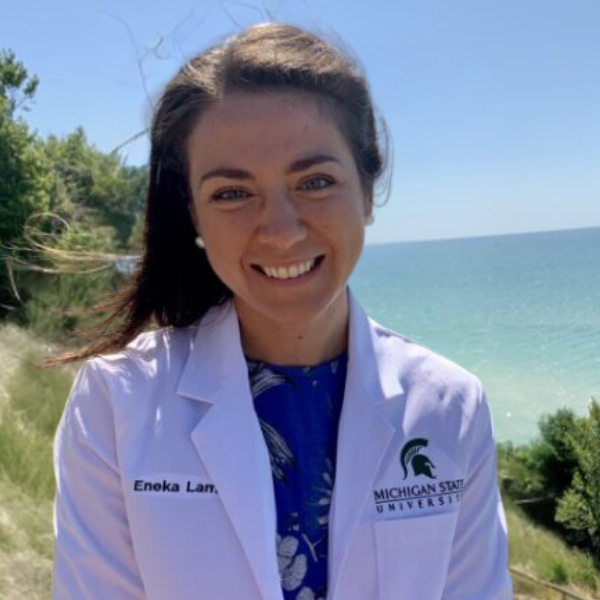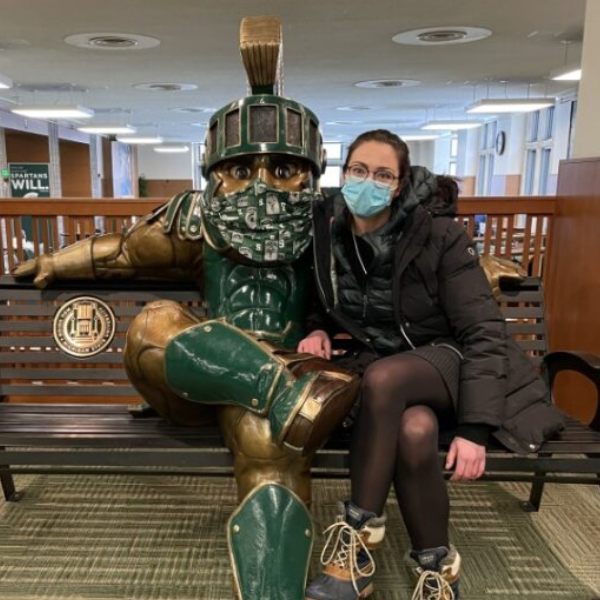Eneka Lamb Brings Global Perspective to Rural Health Leadership Role
September 26, 2023
 After growing up in Hong Kong, one of the most densely populated cities on Earth, Eneka Lamb enrolled in the College of Human Medicine and naturally – or, more likely, surprisingly – joined the Leadership in Rural Medicine program.
After growing up in Hong Kong, one of the most densely populated cities on Earth, Eneka Lamb enrolled in the College of Human Medicine and naturally – or, more likely, surprisingly – joined the Leadership in Rural Medicine program.
“One thing I know is I’m fascinated with different cultures,” she said. “Being in Midland is a cultural experience.”
Lamb, a third-year student, took a break from a surgical rotation in Midland to talk about her interest in rural medicine and her recent election as chair of the National Rural Health Association’s Student Constituency Group.
“I really thought I would be more interested in global health,” she said. “I was always interested in underserved populations,” particularly women and children.
A three-and-a-half year stint as a Peace Corp volunteer in rural Guyana reinforced what she already knew: that underserved populations are everywhere, in rural areas as well as urban centers.
“Health is universal,” Lamb said, “and illness is universal.”

The hospital where she worked had no electricity, no running water, and, frequently, no doctor.
“I helped with whatever they needed me to do,” Lamb said. “What I learned is how to be resourceful. I was completely absorbed in this community.” When the people she served asked if there were Indigenous people in the U.S., she answered “yes.”
“I started looking at the health statistics of Native Americans, which are pretty alarming,” she said.
Lamb’s path to MSU perhaps began before she was born. Her parents, David and Mary Lamb, both graduated from MSU. After her father earned a law degree from UM, they moved to Japan and three years later settled in Hong Kong, where her father was general counsel for a company, and her mother worked for Motorola. Eneka and her younger brother and sister were born there.
“I thought it was a really exciting and dynamic experience,” Lamb said, which allowed her family to travel extensively throughout Asia. “I think we developed an understanding of different cultures.”
She earned a Bachelor of Science degree from Duke University in global perspectives of maternal and child health, a major she designed. After returning from Guyana, she earned a master’s degree in physiology from Georgetown University.
“I think I was always interested in medicine,” Lamb said, “but I wasn’t sure in what capacity.” Her Peace Corp experience affirmed her interest in primary care, either family medicine or obstetrics and gynecology.
 She enrolled in the College of Human Medicine and signed up for the Leadership in Rural Medicine program. In Midland, “the surgeons I met are great mentors,” she said. The following week, she would assist surgeons in the Village of Pigeon, population 1,208 – about as far from Hong Kong in miles as in culture.
She enrolled in the College of Human Medicine and signed up for the Leadership in Rural Medicine program. In Midland, “the surgeons I met are great mentors,” she said. The following week, she would assist surgeons in the Village of Pigeon, population 1,208 – about as far from Hong Kong in miles as in culture.
As chair of the NRHA’s Student Constituency Group, she plans to encourage more medical students to become involved in the organization, a nonprofit that includes thousands of members in health care dedicated to providing leadership in rural health issues.
“In a lot of organizations, students are not being utilized,” she said. “To me, students really have a lot of untapped bandwidth.”
Chairing the group will demand much time from her already-busy schedule.
“You do your best to make the time,” Lamb said. “I’m definitely eager to learn about the communities in Michigan. I love learning, but I love putting what I learn into practice. This is something that really feeds my passion.”

